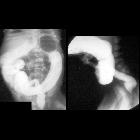total colonic aganglionosis
Zuelzer-Wilson syndrome, also known as total colonic aganglionosis, is a subset of Hirschsprung disease, in which the whole colon is aganglionic.
Epidemiology
It is uncommon and accounts for 2-13% of cases of Hirschsprung disease . Compared with Hirschsprung disease which has a marked male predominance, Zuelzer-Wilson syndrome only has a slight male predominance (M:F of 1-1.5:1) .
Associations
The condition has been associated with other congenital syndromes, including congenital central hypoventilation syndrome (Ondine's curse) .
Clinical presentation
Similar to Hirschsprung disease, most patients present as neonates, or less commonly as infants . Very rarely do patients present beyond infancy.
The presentation can have either an acute or chronic course :
- acute (generally neonates): features of bowel obstruction (e.g. abdominal distension, not passing meconium, etc.)
- chronic (generally after the neonatal period): chronic constipation, failure to thrive
Pathology
Zuelzer-Wilson syndrome is characterized by aganglionosis (absence of ganglion cells) throughout the entire colon . Additionally, variable amounts of the small intestine may also be involved .
Treatment and prognosis
Multiple procedures have been devised to treat the condition, including ileorectal anastomosis, ileum pouch anal anastomosis without a clearly superior method . If there is small bowel involvement, intestinal transplantation may be required .
Siehe auch:

 Assoziationen und Differentialdiagnosen zu total colonic aganglionosis:
Assoziationen und Differentialdiagnosen zu total colonic aganglionosis:

